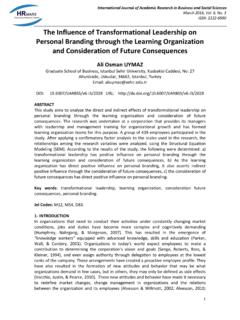Transcription of Factors Affecting Growth of Information …
1 International Journal of Academic Research in Business and Social Sciences July 2013, Vol. 3, No. 7 ISSN: 2222-6990 341 Factors Affecting Growth of Information Communication Technology Firms in Nairobi, Kenya Duncan Mwangi Ikua Kenya School of Government, P. O. Box 8475-00200, Nairobi, Kenya Email: Prof. Namusonge Jomo Kenyatta University of Agriculture and Technology, School of Human Resource Development, P. O. Box 62000-00200, Nairobi, Kenya Email: DOI: URL: ABSTRACT Entrepreneurship plays an important role in the socio-economic development of the country. Its significance can be seen in terms of contribution towards economic Growth , employment creation, poverty reduction and development of an industrial base. Kenya is going through a paradigm shift from an industry based economy to a knowledge based economy anchored on ICT.
2 The government has reiterated the development of ICT industry in the country given its strategic importance. These commitments manifest in the various policies and strategies that the government has put in place over time, aimed at the Growth and expansion of ICT in the country. Despite the policy and strategy pronouncements, there are various constraints that are currently facing the Growth and expansion of ICT in the country especially amongst ICT providers. This study sought to assess the Factors that affect the Growth of ICT firms in Kenya by focusing on the ICT providers in Nairobi. The Purpose of the study was to establish the Factors Affecting Growth of ICT Firms in Nairobi. The study involved a case study of ICT firms in Nairobi. The target population constituted ICT service providers located in Nairobi.
3 The study targeted 92 firms out of 304 registered ICT service providers in the CCK database. The sampling frame used was acquired from the CCK directory of licensed ICT providers 2012. Stratified random sampling technique was used based on categories of ICT service providers registered by CCK. Questionnaires were used to collect data from a sample of 92 ICT Firms. The respondents were owner/ managers and selected employees. The study findings indicate that access to markets significantly affects Growth of ICT firms negatively or positively. Access to market Information , The presence of a wide market for ICT products and services, ICT usage and penetration and presence of ICT-related services promote Growth and expansion of ICT firms. Competition in the ICT sector inhibits Growth of ICT firms.
4 The study recommends the following: Pertaining access to markets; the government should undertake to make markets work. This can be achieved by promoting the number and competitiveness of ICT firms by reducing the cost of doing business and, generally, creating a more favourable environment for businesses to thrive International Journal of Academic Research in Business and Social Sciences July 2013, Vol. 3, No. 7 ISSN: 2222-6990 342 while improving the quality of employment in the sector. The government should allocate at least 25 percent of its procurement requirements to the sector. The Government should encourage sub-contracting arrangements between large and medium firms, and the SMEs. Capacity building of SME Associations will further promote business linkages within the sector.
5 The Government should restrict dumping of ICT products and facilitate marketing of SME products in both local and international markets. Keywords: ICT firms, access to markets, Growth Introduction Entrepreneurs are individuals who discover market needs and launch new firms to meet those needs. They are risk takers who provide an impetus for change, innovation, and progress in economic life. The Small and Medium Enterprises (SMES) are businesses in both formal and informal sectors, classified into farm and non-farm categories employing 1-50 workers (GoK, 2005). These enterprises cut across all sectors of the Kenyan economy and provide one of the most prolific sources of employment creation, income generation and poverty reduction. Today s business world has been deeply influenced by Information and Communication Technologies (ICT) and the application of ICT among business is widespread.
6 ICTs are rapidly changing global production, work and business methods and trade and consumption patterns in and between enterprises and consumers. The Small and Medium Enterprises (SMEs) have been credited with enormous contribution to the Growth of the developed economies of the world. In the same vein, the Information and communication technologies (ICTs) and particularly the internet have played their own part in those economies. The American economy, the biggest economy in the world, depends largely on the success of SMEs for innovation, productivity, job Growth and stability (Chandler, 1977). The rapid transformations of the high performing Asian countries such as India, Malaysia, Indonesia, Taiwan and Hong Kong have also been hailed as proof that SMEs are major catalysts to economic development.
7 Their importance to any economy hinges on their ability to stimulate ingenious entrepreneurship, to provide employment to a greater number of people, to mobilize and utilize domestic savings and raw materials, to provide intermediate raw-materials or semi-processed products to large scale enterprises and to curtail rural-urban migration. The SMEs provide the cornerstones on which any country s economic Growth and stability rests. As the world economy continues to move toward increased integration as a result of advances in Information communications technology, and the increasing reduction in trade barriers, some of the greatest opportunities for small businesses will arise from their ability to participate in the regional and international markets (Mutula & Brakel, 2006).
8 The Kenya Vision 2030 envisages ICT as one of the key drivers of economic development as we strive to achieve the aspirations of the county s development plan. The SME sector is important in the social economic development of Kenya and is perceived as an engine for Growth (GOK, 2008). However, SMEs seem ill equipped to confront the challenges of globalization, whose hallmark is Information Communication Technology (ICT) and innovation, a major determinant of competitiveness. International Journal of Academic Research in Business and Social Sciences July 2013, Vol. 3, No. 7 ISSN: 2222-6990 343 At the turn of the year 2010-2011 the World Bank published a press release accompanying its December 2012 Kenya Economic Update that showed that the overall Kenyan economy was at a Tipping Point.
9 The report estimated percent Growth in 2010 and percent in 2011. The report specifically identified the telecommunications revolution as a key driver to the economic Growth of the country. The Growth in ICT is significant and has out-performed all other sectors over the last decade. Without ICT, Kenya s Growth rate would have been only percent since 2000, barely exceeding population Growth . The report attributes the explosive Growth in ICT to the liberalization of the telecommunications sector, which induced competition and innovation, resulting in considerable investment and job creation. The report argues that Kenya could develop into a regional hub of IT innovations and IT-enabled services due to its cost advantages, investment in enabling infrastructure including fiber optic cables and a well educated and urbanized labor force, (World Bank, 2011).
10 Kenya is home to a modest ICT/ICTE industry, most of which has emerged after the recent liberalization of the telecom sector. Leaving aside the vast group of distributors and resellers of IT equipment, which in some cases can hardly be included in the category, the Kenyan ICT/ICTE sector is mainly comprised of small enterprises active in fields such as software customization, web design, ICT value-added services and IT consultancy. Typically, the services provided are very basic. In addition, some hardware assembling activity was set up after the government lifted the import duty on parts, but the amount is still very limited. The export of services in the form of outsourced processes is also very limited. There are only a handful of active BPO firms and call centres. Currently there are 304 ICT service providers in the register of unified licensing framework licensees by held CCK as at February 2012.


















